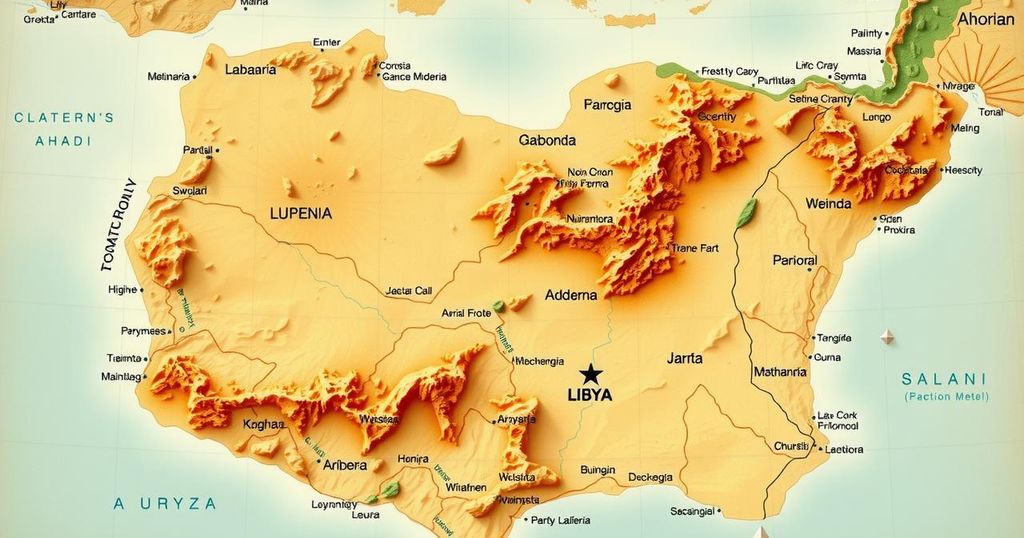World news
AFRICA, AFRICA COMMAND, AMERICA, BELARUS, BIDEN, BRA, BRAK AL - SHATI, EUROPE, EUROPE/ASIA, HA, HARCHAOUI, INTERNATIONAL RELATIONS, ITALY, LIBYA, LONDON, MILITARY, MOSCOW, NORTH AMERICA, PENTAGON, ROME, RUSI, RUSI THINK TANK, RUSSIA, SADDAM, SANCTIONS, TRIPOLI, U. S, U. S. AFRICA COMMAND, UNITED KINGDOM, UNITED STATES, US, VLADIMIR PUTIN, WAR, WASHINGTON
Sofia Rodriguez
0 Comments
Geopolitical Rivalry in Libya: Examining U.S. and Russian Influence
The article discusses the ongoing geopolitical rivalry between the United States and Russia in Libya, emphasizing the role of General Khalifa Haftar and U.S. efforts to reduce Russian influence. Despite military engagements, skepticism persists regarding Haftar’s willingness to distance himself from Russia, although his son Saddam is exploring ties with the U.S. The future of U.S. involvement under the Trump administration remains unclear.
In recent developments, the geopolitical dynamics between the United States and Russia are playing out in Libya. This month, former President Donald Trump expressed an inclination towards engaging with Vladimir Putin while simultaneously criticizing American allies. Libya continues to depict a tense rivalry, reminiscent of the Cold War, as the United States and Russia vie for influence, particularly in light of a recent B-52 bomber visit by the U.S. Air Force aimed at securing support from local leaders to weaken Russia’s foothold in the region.
General Khalifa Haftar, the military commander of eastern Libya, is crucial to the U.S. strategy in the region. His partnership with Russia allows Moscow to utilize Libya as a strategic base to support regimes in Africa that pose threats to U.S. interests. Recently, Haftar and his sons strengthened ties with Russia during a visit to Belarus, indicating a shift towards Moscow. Jalel Harchaoui of the RUSI think tank noted that U.S. attempts to sway Haftar were primarily driven by the Pentagon, highlighting a lack of cohesive policy from the Biden administration regarding Libya.
Military cooperation efforts have included training exercises conducted by U.S. African Command, which engaged with Haftar’s forces while reinforcing the presence of B-52 bombers. However, Harchaoui pointed out that Haftar is likely to remain aligned with Russia, given the military support he receives. The duality of Libya’s political structure complicates the U.S. attempts, as Haftar maintains a significant militaristic control over the east, while local militias dominate the west.
Experts like Ben Fishman express skepticism about the likelihood of Haftar distancing himself from Russia, labeling U.S. military gestures as insufficient to sway him. Contrarily, Mohamed Eljarh from Libya Outlook suggests a more favorable outlook, noting that Haftar’s son, Saddam, is pursuing closer ties with the U.S. This development raises questions about whether the Trump administration, known for its unconventional stance on Russia, would engage positively should Saddam initiate contact.
Analysts, including Umberto Profazio, caution that the Trump administration’s focus may not favor a robust U.S. presence in Libya, potentially allowing the Russian influence to persist. The ongoing competition and diplomacy in Libya reflect significant implications for both U.S. and Russian foreign policy, underscoring the continuing struggle for dominance in the region.
In summary, the geopolitical landscape in Libya reveals an ongoing rivalry between the United States and Russia, with both nations attempting to leverage influence through military alliances. Despite U.S. efforts to sway General Khalifa Haftar from Russia, skepticism remains about the success of these strategies given Haftar’s established partnerships. Moreover, emerging diplomatic ties between Haftar’s son and the U.S. could signify a shift, though the Trump administration’s future engagement remains uncertain. The situation in Libya continues to represent a complex interplay of international relations, highlighting both opportunities and challenges for U.S. policies in the region.
Original Source: www.defensenews.com




Post Comment